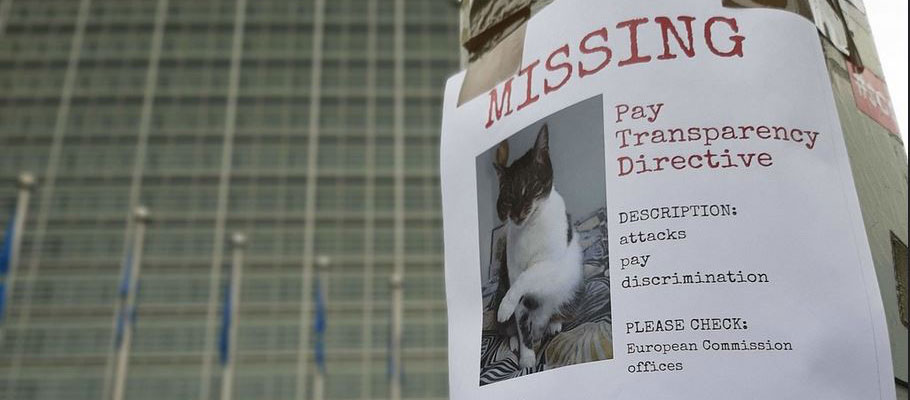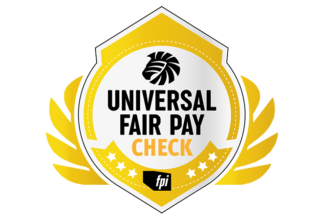Our advice to the EU: Greater transparency!
EUROPEAN COMMISSION DISCUSSES DRAFT DIRECTIVE
Under the presidency of Ursula von der Leyen, one issue is at the top of the European Commission's agenda: equal pay. This translates to a new EU Directive. The good thing about EU Directives is that once they enter into force, they become national law in all member states. Probably the quickest way to reach the goal! This is why in May 2020, we took part in the consultation for the new Directive – and, among other things, made a clear plea for a transparency obligation in both large and small companies. Hopefully, the new Directive will be passed in 2021. Here is the letter to the Just Equal Pay Team in its original wording.
Regarding: Consultation procedure regarding the gender pay gap – transparency on pay for men and women
25 May 2020
Dear Just Equal Pay Team,
Concerning the fact that Germany has a low unemployment rate, decent minimum wage, dual vocational learning system, and other prerequisites for equal pay in place, its gender pay gap is unacceptably high – 20 percent. Since 2017 in Germany, the Act to promote Transparency in Wage Structures among Women and Men (the Act) is in place. It consists of three main components: individual right to obtain information on the individual salary in comparison to peers, company reporting obligations, and the call upon companies to evaluate their remuneration systems.
In July 2019, the first evaluation of the Act has been published. The positive outcome of adopting the Act was that more than 40 percent of the companies have already reviewed their remuneration systems and that also triggered a public discussion about equal pay. However, the individual entitlement to access to information has a low take-up rate – only four percent of employees surveyed in companies with more than 200 employees have filed a request, considering that only 30 percent of all employees in Germany are in fact entitled to use this right. The burden to act lays currently in Germany mostly on individuals, which leads to no greater effect on the elimination of the gender pay gap. In general terms, the Act has triggered a public debate on transparency and breaking the persistent taboo of talking about money and remuneration in particular.
Based on these facts and its imminent work with German companies, the FPI Fair Pay Innovation Lab gGmbH recommends the European Commission to:
- advance the 2014 Pay Transparency Recommendation (2014/124/EU) at the level
of a Directive; - enact regular audits in companies including corrective and follow-up measures of previous audits with an outcome of an equal pay strategy plan including goals setting and a report to the appointed government body, which has the power to impose sanctions for non-compliance and for cases of discrimination;
- strengthen the role of software tools for gender pay gap analysis and equal payment strategies in pay audits;
- oblige companies to regularly inform about the pay levels and gender pay gaps their employees as well as make this information publically available. This obligation shall be applicable to companies of all sizes, especially considering start-ups, where the issue of equal pay is often being neglected or entirely omitted since the beginning of their foundation. Such reporting obligation will not only contribute to the general awareness about the problematics of pay inequalities but prevents its reproduction; and
- construct measures for all companies of different sizes, as companies may vary in their ability to fulfill the obligations, thus, making a tailored approach to companies a suitable option.
We strongly support obligatory policy measures for all companies enforcing transparency. Many differences and unequal pay are not visible due to a lack of transparency and formalized remuneration systems.
Yours sincerely,
Henrike von Platen
CEO / Founder
FPI Fair Pay Innovation Lab gGmbH
Photo by courtesy of © ETUC
UNIVERSAL FAIR PAY CHECK
The easy way to fair pay: Regardless of local legislation and the corresponding test methods, the size of the company or the form of the organisation. In every company worldwide.
LEARN MORE
Companies
Knowing about the pay gap and being willing to rid the world of the unjust state of affairs are evidently not enough to actually ensure fair pay. It is right here ...
LEARN MORE
Best Practice wanted
We are firmly convinced that pay equity could be possible tomorrow – if everyone wanted it. That is demonstrated by those companies where things are already fair(er).
LEARN MORE



